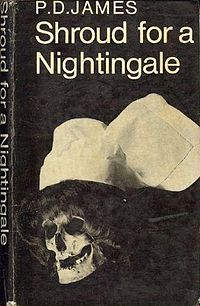
This is the quintessential closed community – even a closed room – mystery, with a fairly short list of suspects, all known to each other and all having something to hide. During an inspection at the Nightingale Nursing College, the ‘mock’ patient during a classroom demonstration of tube feeding is fatally poisoned. Who would want to murder inoffensive student nurse Pearce? Then it emerges that she had been a last-minute replacement for another of the students, Jo Fallon, who had suddenly succumbed to a nasty bout of flu. When Fallon herself is found dead in her room less than two weeks later, the other residents of the training college and Chief Inspector Dalgliesh suspect that the two deaths are connected.
The complexity of the characters is one of the delights when reading PD James. Unlikeable characters turn out to have wholly innocent explanations for their rather suspicious carrying-on, while the more likeable ones have the most to hide. The author is sharply observant and remorseless in her portrayal of the arrogance of surgeons and the unconscious selfishness of young girls in a school environment.
James is a peerless creator of atmosphere. She herself has always claimed that the first thing that comes to her when embarking upon a new novel is the setting. Undoubtedly, Nightingale House, the setting for most of the events in this book, singularly inappropriate for a nursing college, is almost as vividly described as any of the characters. It is a dark, nasty house, an evil house, where crimes of abuse, neglect and death had previously taken place. The final scene, when the house is finally demolished, is a masterpiece of descriptive writing which conveys so much more than just a sense of place.
Golden Age reinvented
Her novels still enchant readers of all ages, but at the same time there is a sort of timeless quality to them. This is an author who took on the constructs of crime fiction of the Golden Age and made them resolutely her own. Yet, perhaps because of her very longevity – she is still planning another Dalgliesh novel – it is impossible to box her into any single decade, other than to say that this is unhurried prose that you would expect from a few decades ago. There is a real sense of ‘we’ve got all the time in the world’ in a PD James novel. The plot does not shock or turn you and your expectations upside down in a single instant. Instead, it builds atmosphere brushstroke by brushstroke, with many cunning and telling little details.
For example, we are introduced to Miss Muriel Beale and her flatmate Miss Angela Burrows in the first chapter of the book in such vivid detail that we cannot help but believe that they are going to be the main protagonists. They then recede completely into the background until very near the end of the book, when they reveal one minor but important point to help Dalgliesh in his investigations. You feel you are in the hands of a very accomplished storyteller, completely in control of her material, just like Jane Austen, whom James hugely admires. “Don’t you think Austen would have been a very good crime fiction writer, if she were writing today? Emma is in essence a detective novel,” she says.